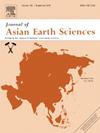喀拉拉邦中部(印度西南部)的液化沉积记录,作为板块构造地区的地震指标
IF 2.7
3区 地球科学
Q2 GEOSCIENCES, MULTIDISCIPLINARY
引用次数: 0
摘要
在远离板块边界的地方,印度陆地板块内的地震带在很大程度上仍未被发现。在这些地区发生的中度地震已被证明具有巨大的破坏性,因为这些地震并不频繁发生,而且社会缺乏相应的防范措施。由于构造运动的地质表现形式十分微妙,因此很难确定板块构造地区的危险区,因此必须制定适合当地的地质标准,以隔离潜在的震源区。虽然保存在沉积剖面中的地震诱发液化可作为地震的代用指标,但在板块构造地区,其范围仍被低估。在此,我们提供了一种基于实地的方法,用于绘制印度克拉通西南部巴拉塔普扎河以南地区的液化特征图。我们利用实地数据对近场地震潜力进行了约束。我们在大约 100 平方公里的区域内发现了由地震引起的土壤液化,其形式为砂堤和砂岩,现有数据表明发生过两次液化--一次在 2.0 ka 到 2.5 ka 之间,另一次发生在公元前 0.78 ka 左右。土壤液化特征的空间分布和规模,在一个近代偶尔发生小地震的地区,表明该地区有一个潜在的地震源,可以产生矩震级(Mw)在 5.5 到 6.5 之间的地震。因此,目前的观测结果对于确定该地区的地震危险性至关重要,这里开发的方法也可用于其他潜力未知的地区。本文章由计算机程序翻译,如有差异,请以英文原文为准。
Sedimentary records of liquefaction from central Kerala (southwestern India), as earthquake indicators in a cratonic area
Far from the plate boundaries, the seismogenic zones within the cratonic areas of Indian land mass had remained largely undetected. The moderate earthquakes in such areas have proved to be hugely damaging because of their infrequency and consequent lack of societal preparedness. As the subtle geological expressions of tectonism make identifying hazardous zones in cratonic areas difficult, it is important to develop locally appropriate geological criteria to isolate potential seismic source zones. Although seismically induced liquefaction preserved in the sedimentary sections is useful as an earthquake proxy, its scope remains underestimated in cratonic regions. Here we offer a field-based methodological approach to mapping liquefaction features from such an area, located south of the Bharathapuzha River in the southwestern part of the Indian craton. We used the field data to constrain the near-field earthquake potential. The earthquake-induced soil liquefaction, in the form of sand dikes and sills, was identified within an area of roughly 100 km2, and the available data suggest two episodes of liquefaction – the one between 2.0 ka and 2.5 ka, and a later event around 0.78 ka BP. The spatial distribution and the dimension of the soil liquefaction features, in an area known for the occasional spurt in minor earthquakes in recent times, are suggestive of a potential seismic source in the region that can generate earthquakes of moment magnitudes (Mw) ranging from 5.5 to 6.5. Thus the present observation is a vital input for constraining the region’s seismic hazard and the methodology developed here can be used in other areas of unknown potential.
求助全文
通过发布文献求助,成功后即可免费获取论文全文。
去求助
来源期刊

Journal of Asian Earth Sciences
地学-地球科学综合
CiteScore
5.90
自引率
10.00%
发文量
324
审稿时长
71 days
期刊介绍:
Journal of Asian Earth Sciences has an open access mirror journal Journal of Asian Earth Sciences: X, sharing the same aims and scope, editorial team, submission system and rigorous peer review.
The Journal of Asian Earth Sciences is an international interdisciplinary journal devoted to all aspects of research related to the solid Earth Sciences of Asia. The Journal publishes high quality, peer-reviewed scientific papers on the regional geology, tectonics, geochemistry and geophysics of Asia. It will be devoted primarily to research papers but short communications relating to new developments of broad interest, reviews and book reviews will also be included. Papers must have international appeal and should present work of more than local significance.
The scope includes deep processes of the Asian continent and its adjacent oceans; seismology and earthquakes; orogeny, magmatism, metamorphism and volcanism; growth, deformation and destruction of the Asian crust; crust-mantle interaction; evolution of life (early life, biostratigraphy, biogeography and mass-extinction); fluids, fluxes and reservoirs of mineral and energy resources; surface processes (weathering, erosion, transport and deposition of sediments) and resulting geomorphology; and the response of the Earth to global climate change as viewed within the Asian continent and surrounding oceans.
 求助内容:
求助内容: 应助结果提醒方式:
应助结果提醒方式:


